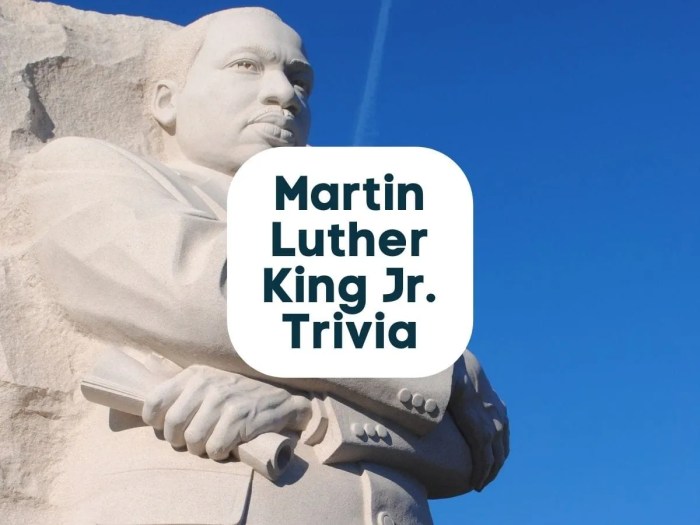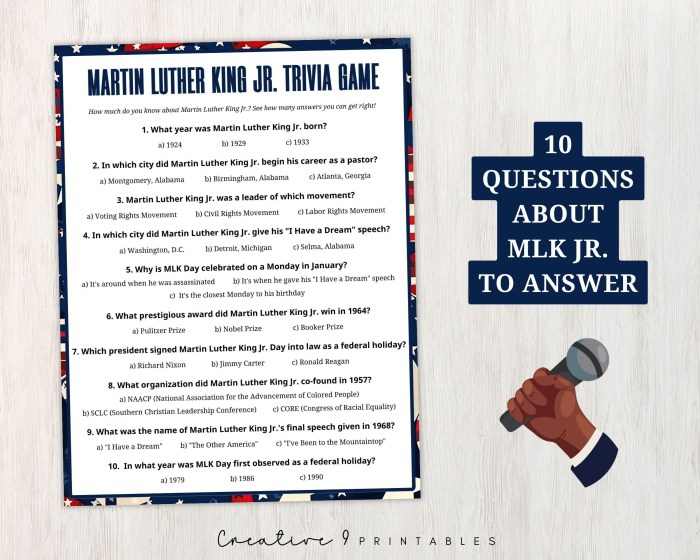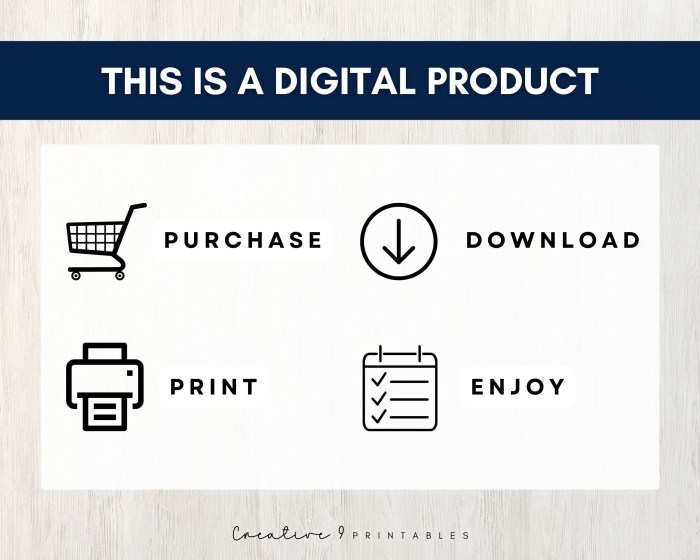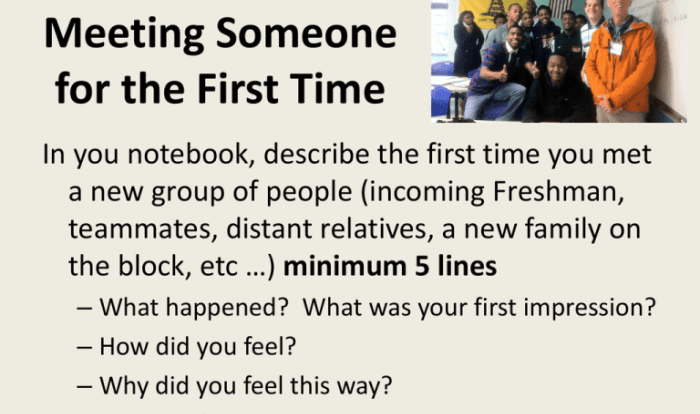Dive into the fascinating world of MLK trivia questions and answers, embarking on a journey to uncover the life, philosophy, and enduring impact of Dr. Martin Luther King Jr., a towering figure in the annals of the Civil Rights Movement.
Prepare to test your knowledge and deepen your understanding of this iconic leader.
From the pivotal moments that shaped his career to the profound words that continue to inspire, this exploration promises an enlightening experience.
Introduction to MLK Trivia Questions and Answers

Martin Luther King Jr. was a prominent leader in the American Civil Rights Movement. His unwavering advocacy for nonviolent resistance and his iconic “I Have a Dream” speech played a pivotal role in shaping the course of history and inspiring countless individuals.
The MLK trivia questions and answers presented here aim to not only test your knowledge about Martin Luther King Jr.’s life and legacy but also to encourage a deeper understanding of the Civil Rights Movement and its profound impact on American society.
Key Historical Events and Milestones

Martin Luther King Jr.’s life and career were marked by significant events and milestones that shaped the Civil Rights Movement and left a lasting impact on American history.
From his early days as a young pastor in Montgomery, Alabama, to his leadership of the March on Washington and his untimely assassination, King’s journey was filled with challenges, triumphs, and unwavering dedication to the cause of racial equality.
Birth and Early Life
Martin Luther King Jr. was born on January 15, 1929, in Atlanta, Georgia. He grew up in a religious and politically active family, which influenced his early development and commitment to social justice.
Montgomery Bus Boycott, Mlk trivia questions and answers
In 1955, Rosa Parks’ refusal to give up her seat on a Montgomery bus sparked the Montgomery Bus Boycott, which became a pivotal moment in the Civil Rights Movement.
King emerged as the leader of the boycott, advocating for nonviolent resistance and the desegregation of public transportation.
Southern Christian Leadership Conference (SCLC)
In 1957, King co-founded the Southern Christian Leadership Conference (SCLC), an organization dedicated to nonviolent direct action to achieve racial equality.
The SCLC played a crucial role in organizing protests, marches, and other campaigns throughout the South.
“I Have a Dream” Speech
On August 28, 1963, King delivered his iconic “I Have a Dream” speech at the March on Washington for Jobs and Freedom.
The speech, which called for an end to racial segregation and discrimination, became a defining moment in the Civil Rights Movement and cemented King’s status as a global icon.
Civil Rights Act of 1964
In 1964, President Lyndon B. Johnson signed the Civil Rights Act into law, a landmark achievement in the fight for racial equality.
The Act outlawed discrimination based on race, color, religion, sex, or national origin in employment, public accommodations, and government programs.
Selma to Montgomery Marches
In 1965, King led a series of marches from Selma to Montgomery, Alabama, to demand voting rights for African Americans.
The marches faced violent opposition from local authorities, but ultimately led to the passage of the Voting Rights Act of 1965.
Assassination
On April 4, 1968, Martin Luther King Jr. was assassinated in Memphis, Tennessee, while supporting a strike by sanitation workers.
King’s death sent shockwaves throughout the nation and sparked widespread protests and riots.
MLK’s Philosophy and Beliefs: Mlk Trivia Questions And Answers

Martin Luther King Jr.’s philosophy of nonviolent resistance and civil disobedience played a pivotal role in the Civil Rights Movement. His belief in the power of love and peaceful protest inspired millions of people to join the fight for equality and justice.
Nonviolent Resistance
King’s philosophy of nonviolent resistance was rooted in the teachings of Mahatma Gandhi. He believed that violence only breeds more violence, and that the only way to achieve lasting change was through peaceful means. King advocated for nonviolent protests, such as sit-ins, boycotts, and marches, as a way to raise awareness of injustice and pressure oppressors to change their ways.
Civil Disobedience
King also believed in the importance of civil disobedience. He argued that when laws are unjust, it is the duty of citizens to disobey them in a peaceful and nonviolent manner. King’s philosophy of civil disobedience was controversial at the time, but it ultimately helped to bring about significant changes in the United States.
Key Beliefs and Principles
King’s philosophy of nonviolent resistance and civil disobedience was based on a number of key beliefs and principles, including:
- The belief that all people are created equal and deserve to be treated with dignity and respect.
- The belief that violence is never the answer and that peaceful protest is the only way to achieve lasting change.
- The belief that civil disobedience is a legitimate form of protest when laws are unjust.
- The belief that love is the most powerful force in the world and that it can overcome even the most entrenched hatred.
Famous Speeches and Writings

Martin Luther King Jr. delivered countless powerful speeches and wrote influential texts that inspired millions during the Civil Rights Movement. His words resonated deeply with people across the nation, and they continue to be studied and celebrated today.
I Have a Dream Speech
King’s “I Have a Dream” speech, delivered at the March on Washington for Jobs and Freedom in 1963, is one of the most iconic speeches in American history. In it, he Artikeld his vision for a future where all people would be treated equally, regardless of their race.
“I have a dream that my four little children will one day live in a nation where they will not be judged by the color of their skin, but by the content of their character.”
Letter from Birmingham Jail
King’s “Letter from Birmingham Jail” was written in 1963 while he was imprisoned for protesting against segregation in Birmingham, Alabama. In the letter, he argued that nonviolent resistance was the most effective way to achieve social change.
“Injustice anywhere is a threat to justice everywhere. We are caught in an inescapable network of mutuality, tied in a single garment of destiny. Whatever affects one directly, affects all indirectly.”
Trivia Questions
- What was the date of King’s “I Have a Dream” speech?
- In what city was King imprisoned when he wrote the “Letter from Birmingham Jail”?
- Which of King’s speeches famously included the phrase, “We shall overcome”?
- What was the central message of King’s “Letter from Birmingham Jail”?
Legacy and Impact
Martin Luther King Jr.’s legacy and the Civil Rights Movement continue to profoundly shape society. His nonviolent resistance, eloquent speeches, and advocacy for racial equality have left an enduring mark on history.
Ongoing Significance
King’s work remains relevant today, inspiring ongoing efforts to address racial injustice, discrimination, and inequality. His teachings on nonviolence, love, and compassion have become guiding principles for social movements worldwide.
- His “I Have a Dream” speech continues to resonate as a powerful call for equality and justice.
- The Civil Rights Act of 1964 and the Voting Rights Act of 1965, largely influenced by King’s activism, have had a transformative impact on American society.
- King’s legacy inspires organizations and individuals to continue working towards a more just and equitable world.
Influence on Society
King’s philosophy and actions have had a profound influence on various aspects of society:
- Education:King’s emphasis on education as a key to empowerment continues to shape educational policies and programs.
- Social Justice:King’s teachings have become a foundation for social justice movements, promoting equal rights, fair treatment, and dignity for all.
- Political Activism:King’s nonviolent approach to social change has inspired countless activists and leaders to pursue justice through peaceful means.
Trivia Questions
- Which of King’s speeches is widely regarded as one of the most influential in American history?
- What was the significance of the March on Washington in 1963, led by Martin Luther King Jr.?
- How did King’s philosophy of nonviolence influence the Civil Rights Movement?
Answers to Common Questions
What was the date and location of the “I Have a Dream” speech?
August 28, 1963, at the Lincoln Memorial in Washington, D.C.
What was the main principle of Dr. King’s philosophy of nonviolent resistance?
To confront injustice through peaceful means, believing that love and compassion could ultimately triumph over hatred and violence.


